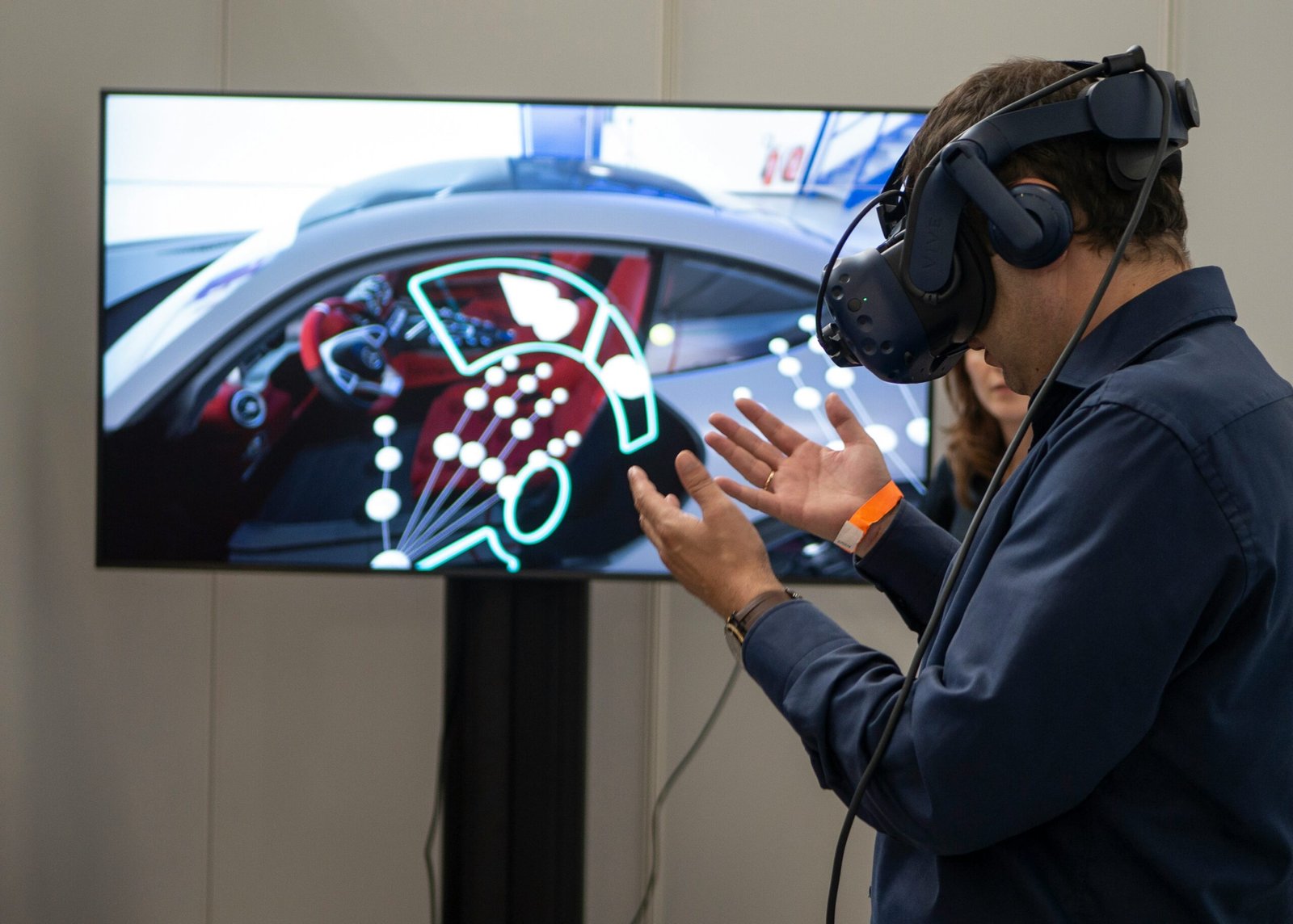Introduction to Decentralized Space
The concept of decentralized space represents a paradigm shift in our understanding of both physical dimensions and theoretical frameworks. At its core, decentralized space refers to the idea that spatial existence is not strictly governed by centralized authorities or structures, but rather exists in a distributed manner. This emerging perspective holds significant implications for a variety of fields, including science, philosophy, and technology. As we navigate through the intricacies of decentralized systems, we begin to question traditional notions of control, ownership, and the nature of existence itself.
In modern science, decentralized space is often associated with advancements in technology such as blockchain, which exemplifies a shift away from hierarchical models to more egalitarian and community-driven frameworks. These models allow for greater autonomy and empowerment among individuals, underscoring the relevance of decentralized concepts in societal structures. This trend not only raises questions about energy distribution and data management but also challenges how we perceive relationships and interactions within various physical and digital spaces.
Moreover, the philosophical implications of decentralized space extend deeply into discussions about identity, agency, and interconnectedness. What does it mean for individual beings to exist in spaces that are not bound by traditional hierarchies? How might our understanding of existence evolve as we embrace decentralization in our societal constructs? These thought-provoking questions compel us to examine the intersections of science and philosophy, as we explore the potential for a more fluid and inclusive conception of spatial existence.
As we embark on this journey through the realms of decentralized space, we invite the reader to ponder these inquiries and consider the profound impacts that decentralized systems can impose on our understanding of both the universe and ourselves.
The Basics of Decentralization in Science
Decentralization in science refers to the transition from centralized systems, where authority and decision-making are concentrated in specific institutions or individuals, toward a more distributed framework enabling broader participation and collaboration. This movement is aligned with the emergence of open-source methodologies, citizen science projects, and collaborative research networks that aim to democratize knowledge production and dissemination. The foundational principles behind this decentralization involve greater transparency, accessibility, and inclusivity in scientific endeavors.
Historically, the scientific community relied heavily on established institutions such as universities and government agencies to direct research funding, methodologies, and ultimately the dissemination of findings. This centralization method often limited the diversity of perspectives and expertise, leading to potential biases and restricted innovation. However, the advancement of modern technologies, especially the internet and digital communication platforms, has catalyzed a shift toward decentralized frameworks that enable myriad participants to contribute. For instance, platforms like ResearchGate and arXiv allow researchers from various backgrounds to share their work and collaborate freely without the constraints of traditional publishing houses.
Another significant example of decentralization in science is the rise of citizen science initiatives, where everyday individuals engage in scientific research. These initiatives not only enhance public understanding of science but also extend data collection efforts beyond the capacities of traditional scientific institutions. Projects like Galaxy Zoo, which enlists volunteers to classify galaxies, exemplify how decentralized participation can lead to significant scientific discoveries and foster a sense of community among contributors.
Ultimately, decentralization in science promotes a multifaceted approach to knowledge construction. By embracing diverse voices and methodologies, the scientific community can advance more holistically, addressing complex challenges from multiple angles while enhancing the credibility and relevance of research outcomes.
Philosophical Perspectives on Space and Decentralization
The concept of space has long intrigued philosophers, prompting debates that intersect with ideas of decentralization. Various philosophical theories offer distinct interpretations of space, addressing its nature, significance, and implications for existence. Notably, the debate between realism and idealism highlights divergent views on whether space is an independent entity or merely a construct arising from human perception. Realists contend that space exists objectively, existing independently from human experiences and thus enabling the discussion of decentralization as an inherent feature of this coherent, objective realm.
Conversely, idealists argue that space is not an entity in itself but rather a product of consciousness, where decentralized perspectives are inherently tied to individual experiences. This raises questions about the very essence of decentralized space: if space is subjective, can decentralization be viewed as a shift in perception rather than a structural rearrangement? Philosophers such as Immanuel Kant have posited that space serves as a framework for human experience, suggesting that our understanding of decentralization may also be limited by our cognitive frameworks.
Moreover, the emergence of postmodern thought encourages a critical examination of authority and hierarchy in conceptualizations of space. The postmodernist argument challenges traditional notions of centralized authority, advocating instead for multiple perspectives and fragmented realities. This aligns with the principles of decentralization, as it promotes a multidimensional understanding of space where multiple narratives coexist. Such a viewpoint invites readers to reconsider their assumptions surrounding both physical and conceptual spaces.
Ultimately, engaging with these philosophical perspectives enables a richer understanding of decentralization in relation to space. By analyzing the interplay between these theories, one can appreciate the complexity of space as not merely a backdrop for existence but as a dynamic and multifaceted concept that shapes both our understanding and lived experiences.
Quantum Mechanics and the Idea of Decentralized Space
Quantum mechanics has radically transformed our understanding of the universe, presenting new perspectives that diverge from classical physics. One of the most profound implications of quantum mechanics is its challenge to traditional notions of space. In contrast to classical theories, where space is viewed as a rigid, isolated backdrop, quantum mechanics introduces a fluid and interconnected framework, thereby endorsing the concept of decentralized space.
Central to this discussion is the phenomenon of entanglement, which Albert Einstein famously referred to as “spooky action at a distance.” In quantum entanglement, particles can become interconnected in such a way that the state of one immediately influences the state of another, regardless of the distance separating them. This suggests that the particles do not exist in a definitive localized space; rather, their properties are interdependent, implying a form of spatial decentralization that challenges our intuitive understanding of distance and locality.
Moreover, the double-slit experiment serves as a foundational example of how quantum mechanics disrupts traditional spatial concepts. When particles such as electrons are subjected to the experiment, they display wave-like behavior, creating interference patterns even when fired one at a time. This indicates that the particle does not have a definite position until it is measured, further illustrating the fluid nature of spatial definitions on a quantum level. The role of the observer in determining the state of these particles adds another layer, suggesting that observation itself might influence the space in which these quantum events unfold, thereby reinforcing the idea of decentralized space.
In examining these quantum phenomena, it becomes clear that our conventional notions of space are insufficient to encompass the complexities unveiled by quantum mechanics. The interplay between observation, entanglement, and the behavior of particles at the quantum level invites a reevaluation of space that aligns with decentralized principles, reshaping our comprehension of the universe as a whole.
Real-World Implications of Decentralized Space
Decentralized space, characterized by the dispersal of authority and control across various nodes, has profound implications across multiple domains such as technology, data management, and social science. In the realm of technology, decentralized systems like Blockchain have emerged as front-runners, offering a transformative approach to data integrity and security. These systems enable peer-to-peer transactions without the need for intermediaries, thereby enhancing transparency and reducing the potential for fraud. Industries such as finance have witnessed the rise of cryptocurrencies, which rely on decentralized ledger technology to operate, enabling fast and secure transactions globally.
In data management, decentralized models offer a compelling alternative to traditional centralized databases. By distributing data across numerous locations, organizations can improve resilience and availability. This approach not only minimizes the risks of data breaches associated with centralized repositories but also empowers users by allowing them greater control over their personal information. For instance, projects that employ decentralized storage solutions, such as IPFS (InterPlanetary File System), illustrate how data can be shared and accessed without relying on a singular point of control, thereby fostering greater user autonomy.
The implications of decentralized space extend into the social sciences as well, where the shift towards decentralized governance structures influences community dynamics and power distributions. Localized decision-making processes emerge, allowing communities to tailor solutions to their specific needs while decreasing dependencies on centralized authorities. This increase in participatory governance exemplifies how decentralized frameworks can reshape societal structures, fostering greater engagement and accountability among citizens. As decentralized models proliferate, they challenge traditional hierarchies and offer innovative pathways towards more democratic and resilient societies.
These examples highlight the transformative potential of decentralized space across multiple fields, showcasing its capacity to redefine industries and influence social structures in meaningful ways.
Interstellar Travel and Decentralized Space Exploration
The concept of decentralized space exploration intertwines deeply with the future of interstellar travel, igniting imaginations across the scientific community. Historically, space exploration has been dominated by centralized authorities such as national agencies, exemplified by NASA and ESA. However, the advent of private space companies and international collaborations has begun to foster a more decentralized approach, democratizing access to the cosmos. This shift encourages a variety of innovative missions that empower independent researchers and engineers to contribute to humanity’s endeavor beyond Earth.
Cutting-edge theories surrounding interstellar travel are now being proposed, emphasizing decentralized frameworks. For instance, the idea of using modular spacecraft setup allows different teams to develop components that can be assembled into a coherent system. This modularity not only reduces costs but also fosters collaboration between various entities, allowing for pooling of expertise and resources. The potential collaboration between academic institutions and private enterprises serves as an inspiring model for future missions aimed at exploring the stars.
Notable projects, such as the Breakthrough Initiatives, exhibit the essence of decentralized exploration. Specifically, Breakthrough Starshot aims to send ultra-lightweight spacecraft to the nearest star system, Proxima Centauri, within a generation. This ambitious plan integrates contributions from numerous scientists and engineers worldwide, demonstrating a collective effort rooted in decentralized principles. The enthusiasm among researchers involved in these endeavors highlights a shared vision of enhanced exploration beyond our solar system, relying on the diverse strengths found in collaborative efforts.
As we navigate toward a future that transcends terrestrial limits, the blending of decentralized methodologies with practices of interstellar travel cultivates a vibrant landscape for innovation and discovery. The passion of those involved in these projects stimulates a collective ambition, igniting hope for a profound journey into the unknown realms of space.
The Role of Technology in Establishing Decentralized Spaces
The concept of decentralized spaces has gained significant traction in recent years, primarily driven by the advent of emerging technologies such as blockchain and artificial intelligence (AI). These innovations play a pivotal role in reconfiguring traditional frameworks of interaction, governance, and community-building. Blockchain technology, known for its attributes of transparency and security, serves as the backbone of decentralized systems, enabling trustless transactions and eliminating the need for intermediaries. By utilizing a distributed ledger, blockchain facilitates peer-to-peer interactions that empower individuals rather than centralized authorities, heralding a shift towards a more democratized structure.
Additionally, the integration of AI into decentralized spaces results in enhanced efficiency and functionality. AI can analyze vast amounts of data quickly, offering insights that facilitate informed decision-making within decentralized networks. This intelligent processing enables systems to adapt and evolve dynamically, ensuring that decentralized spaces are not merely static constructs but instead, responsive environments capable of growth and transformation. Furthermore, AI applications can aid in fostering a sense of community by personalizing user experiences, thus promoting greater engagement among participants.
Technological advancements also contribute to the scalability of decentralized systems. As more individuals and organizations adopt blockchain and AI, the ecosystem becomes increasingly robust, attracting diverse participants. This network effect is essential for building sustainable decentralized spaces, as a larger user base enhances connectivity, resource sharing, and innovation. The synergy between blockchain technology and AI exemplifies the transformative potential of decentralized spaces and underlines the importance of collaborative innovation.
As we explore the implications of these technologies, it is evident that they not only reshape our operational paradigms but also expand our worldview regarding authority and participation in various spheres of life. Emerging technologies are instrumental in establishing decentralized spaces, ensuring their resilience and relevance in the contemporary landscape.
Challenges and Criticisms of Decentralized Space Concepts
The concept of decentralized space, while pioneering and transformative, is not without its challenges and criticisms. One key point of contention revolves around the governance of such decentralized systems. The absence of a centralized authority can lead to ambiguity in decision-making processes and accountability. Critics argue that without a clear governance framework, decentralized space can suffer from a lack of coordination and an increased risk of conflicts among participants. This decentralization might foster an environment of fragmentation where operations or community standards differ significantly, potentially hindering overall efficiency and unity.
Moreover, the technological infrastructure necessary for decentralized space not only requires significant investment but also depends heavily on robust networks that are resilient to potential cyber threats. The decentralized nature can expose systems to vulnerabilities, where an attack on one node might disrupt the entire ecosystem. This leads to the question of security and the assurance that users’ data and transactions are adequately protected. Critics highlight anxiety over data privacy as individuals sharing space in decentralized platforms may expose personal information without sufficient safeguards.
Another critical challenge is accessibility. While decentralized space aims to eliminate gatekeeping, disparities in technological literacy and access to devices can create barriers to entry for many individuals. The assumption that everyone can seamlessly engage in these decentralized frameworks may overlook underlying socio-economic divides. Critics insist that without addressing such disparities, the vision of an inclusive decentralized space remains unattainable, inadvertently favoring those who are already technologically adept.
In examining these challenges and criticisms, it is essential to engage in a balanced discussion that encourages critical thinking regarding the future of decentralized space. Each perspective contributes to understanding the potential limitations and encourages the development of more robust, equitable systems.
Concluding Thoughts and Future Directions
The exploration of decentralized space offers significant insights into both scientific advancements and philosophical discourse. Throughout this journey, we have examined how decentralized systems can reshape our understanding of space, pushing the boundaries of traditional concepts. By leveraging technologies such as blockchain and peer-to-peer networks, decentralized space prompts us to rethink ownership, governance, and even the socio-economic structures that regulate our interactions within physical and digital realms.
One of the key insights from our discussion is the potential of decentralized space to empower individuals and communities. Unlike centralized models that often prioritize the interests of a few, decentralized frameworks democratize access and decision-making, allowing a more equitable distribution of resources and opportunities. This shift in perspective not only raises essential questions about authority and control but also encourages a reevaluation of how we engage with one another in various contexts, from local neighborhoods to global networks.
Moreover, the implications of decentralized space extend beyond merely technological innovations; they reach into the philosophical implications of identity, agency, and the future of human interactions. As we continue to witness the rapid evolution of these concepts, it becomes imperative to consider how they align with our aspirations for a more collaborative and inclusive society. What roles do individuals play in shaping decentralized space? How do these systems challenge our existing notions of community and belonging?
As we look forward, let us remain open to exploring these transformative possibilities. The development of decentralized space invites us to rethink our assumptions about participation and contribution in a rapidly changing world. Readers are encouraged to reflect on how decentralized systems can be integrated into their lives, offering a unique opportunity to engage with an evolving paradigm. The future of decentralized space is not merely a technological frontier but a critical ground for philosophical exploration and societal evolution.
SEO Keyword Tracking and Optimization
Effective SEO keyword tracking and optimization are essential for enhancing the visibility of any blog post, particularly in a complex field like decentralized space. The main focus keyword for this article is “decentralized space.” This term encapsulates the burgeoning idea of distributed systems in both science and philosophy, making it crucial for aligning the content with what readers are actively searching for. Related keywords that support the main theme include “distributed technology,” “blockchain in space,” “decentralized systems,” and “space governance.” Each of these terms connects to different facets of the discussion, providing opportunities for broader reach.
To ensure effective utilization of these keywords, content creators should adopt a strategic approach. Firstly, keywords should be naturally integrated into the title, introductory paragraph, subheadings, and throughout the body of the text. However, it is vital to avoid keyword stuffing; the focus keyword should ideally appear no more than three times within the content. This guideline helps maintain readability while anchoring the SEO relevance of the article.
Furthermore, when planning future articles, writers should conduct keyword research to identify high-traffic terms related to decentralized space. Tools like Google Keyword Planner, SEMrush, and Ahrefs can provide valuable insights into popular search queries. Creating a list of target keywords prior to writing allows for a more deliberate incorporation of terms into the text. It is also helpful to analyze competitors’ content for additional keyword ideas and positioning strategies. By focusing on quality and relevance, writers can ensure that their articles not only attract readership but also provide meaningful discussions around decentralized space and its implications.






